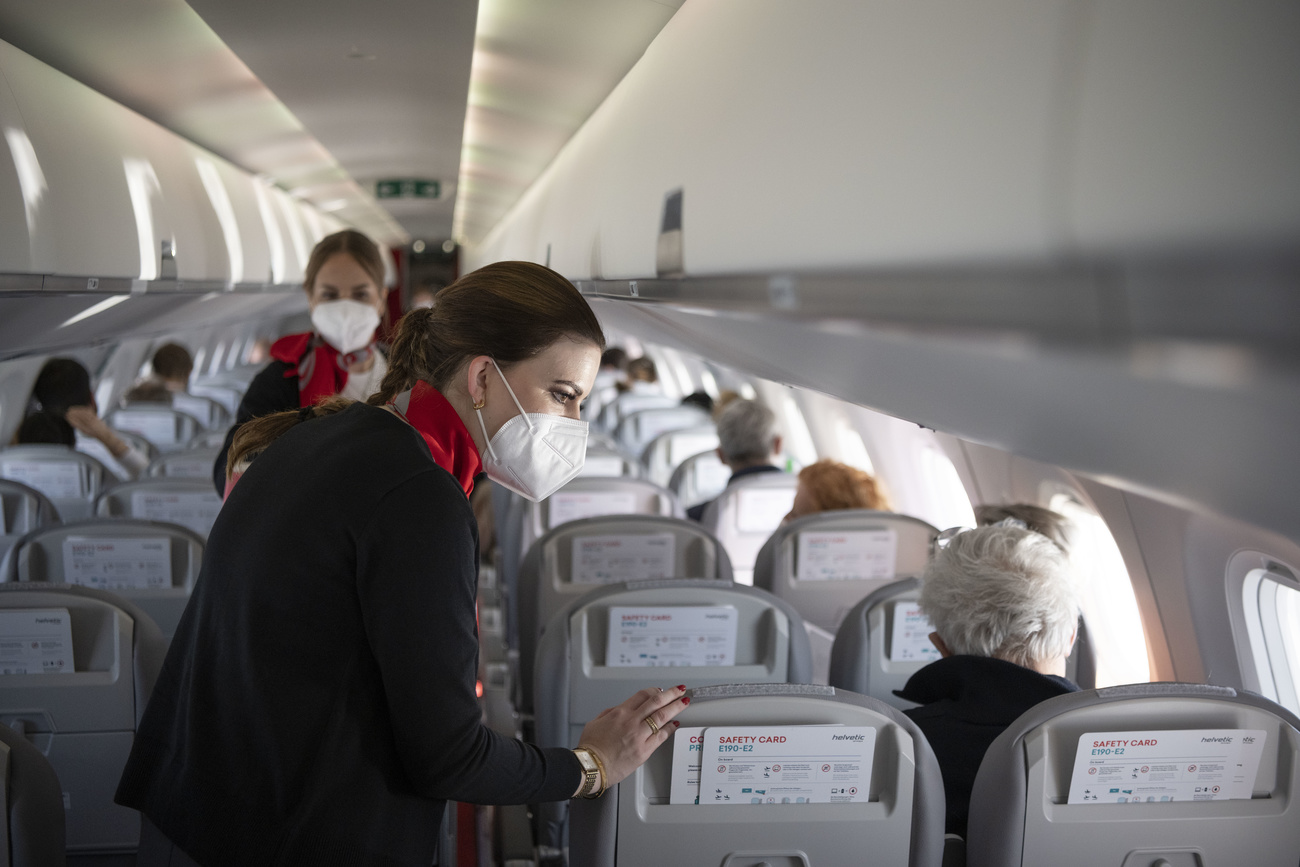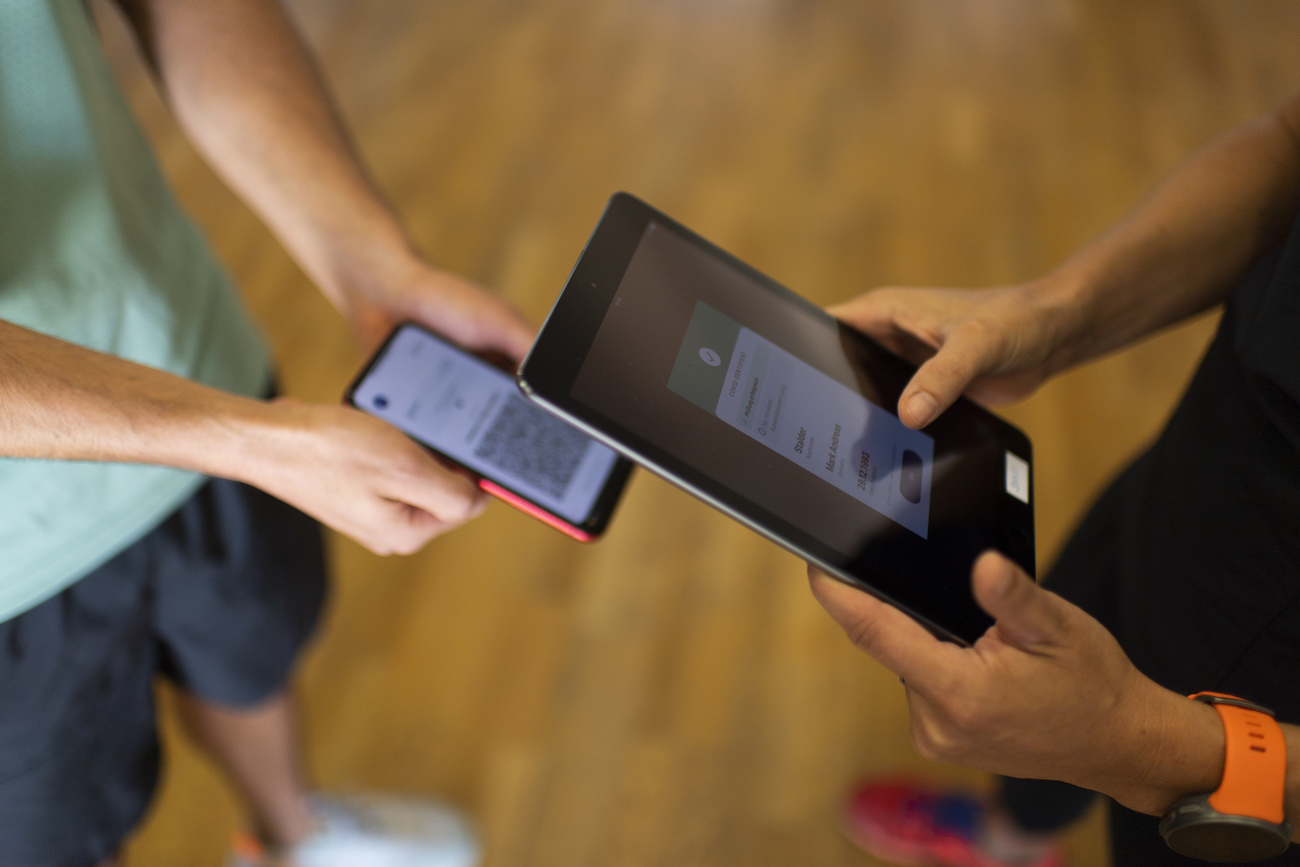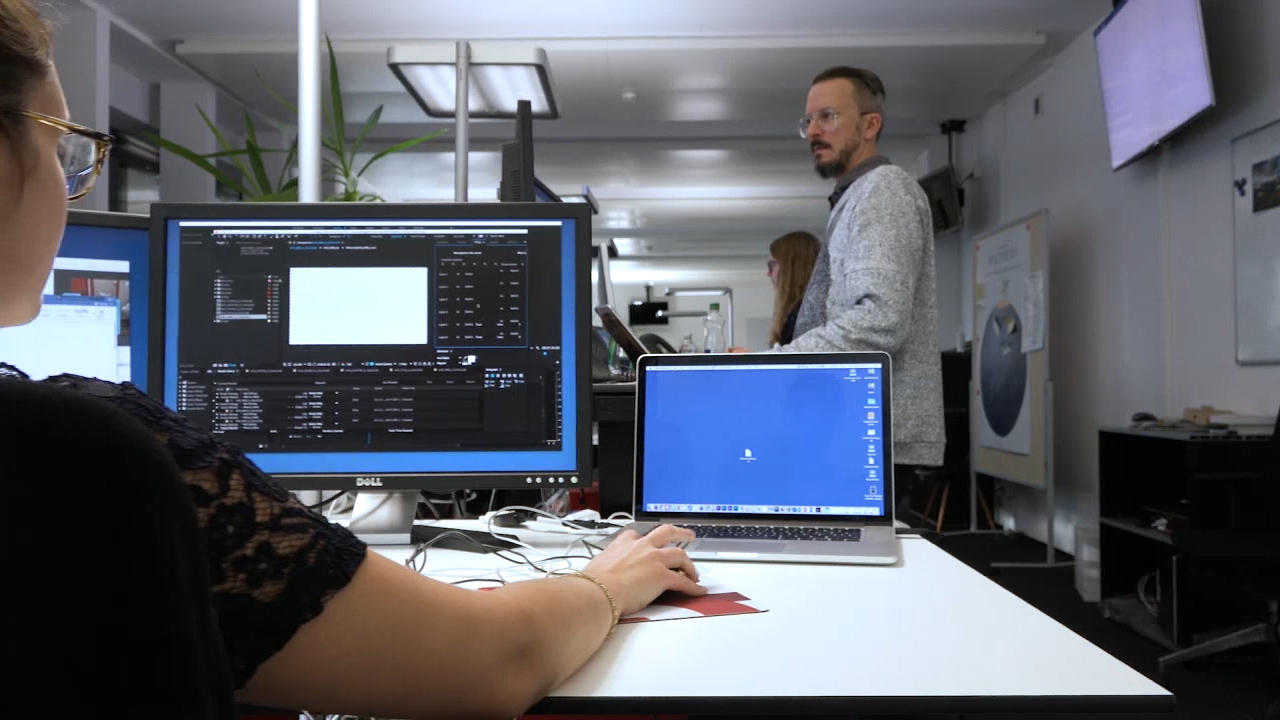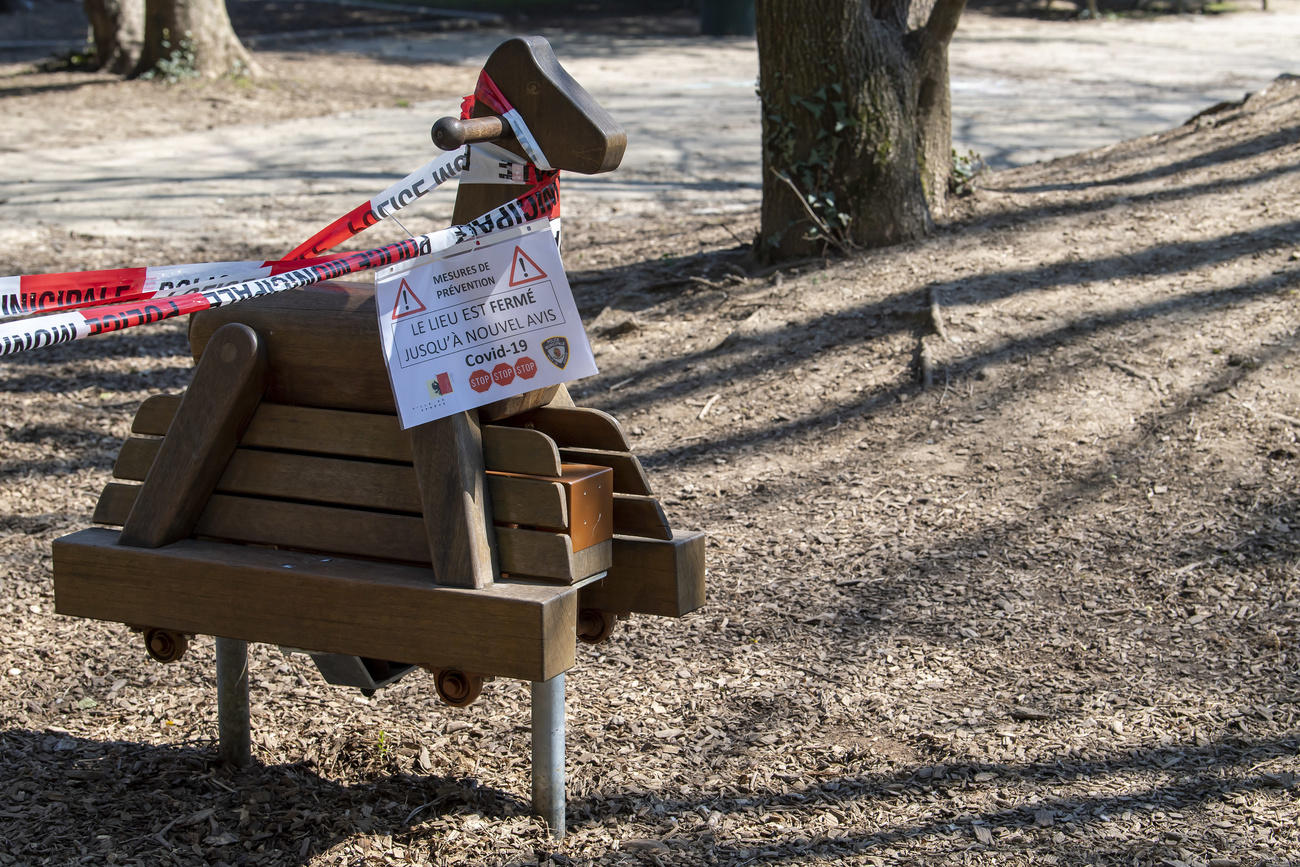Fact check: Will the Covid law lead to mass surveillance?

As voters prepare to have their say on Switzerland’s Covid-19 law, we look at three claims from opponents and supporters on the most polarising element of the text: the Covid certificate.
The certificate has become ubiquitous in everyday life. Since September anyone wishing to visit restaurants, museums and other indoor public places needs to show one.
Support for the measure has been far from unanimous. Three citizens’ movements have managed to force a referendum on the legal amendment, set for November 28.
They, like supporters of the law, are making wide-ranging claims about the need for a certificate. We’ve examined three of these arguments to see if they hold any water.

More
Heard something about Switzerland we should fact check?
In the event of a No vote, it will no longer be possible to deliver Covid certificates, not even for overseas travel. TRUE
“[If the Covid law is rejected], it will no longer be possible to issue Covid certificates – not even for overseas travel,” says the federal governmentExternal link in its official communication to voters.
But on its websiteExternal link, the referendum committee makes the opposite claim: “The government and the cantons can obviously provide Covid certificates on demand for foreign travel. Saying otherwise is completely false.”
So, who is right, and who is wrong?
Everyone we spoke to – authorities and experts – confirmed that, in the absence of a legal basis, it won’t be possible to issue certificates after March 19, 2022. Equally, in Switzerland, it will no longer be possible to tie measures that restrict social activities to the presentation of a Covid certificate. Certificates already in use will nonetheless remain valid until their expiry date, which is one year after the certificate was issued.
That said, the Swiss would still be able to travel. The interior ministry explains that it is not aware of any country that accepts only the certificate to access its territory. As a general rule, it is possible to present another document that certifies Covid-19 vaccination status (such as a yellow vaccination booklet), a negative Covid test result, or proof of recovery from Covid-19. However, it will be necessary to confirm that the document presented as proof is recognised by the country in question.
Once abroad, the question of using the Swiss Covid certificate in restaurants, museums or other establishments where the document is required, remains. Can those who have a QR code generated in Switzerland still have it verified? Will it be accepted? Uncertainty reigns. Technically, the certificate could still be read in other countries because the verification keys are public. But it’s not clear whether the European Union would continue to accept Swiss certificates within its system.

In any case, the government has confirmed that the paper version of the certificate could still be used during travel (as proof of vaccination or recovery but not as a certificate) until its expiry date, on the condition that countries authorise it.
“What other countries accept and how their policies change is not up to us,” the interior ministry says.
The Covid law enables mass electronic surveillance. FALSE
An eye and a slogan: “Mass surveillance? No”. It’s hard to avoid the posters that opponents of the Covid law have plastered all over the country. The referendum’s supporters are fierce critics of electronic contact tracing.
“The law obliges the government to create a total digital surveillance of all citizens, a situation which is comparable to that in China,” they argue.
Here too, the Covid certificate is in their sights.
“When you present your QR code, you have to sign in. This means that they can follow you everywhere. Wherever you go, they know where you are,” Michelle Cailler of Friends of the Constitution, one of the groups opposing the Covid law, told Swiss public radio, RTS, in an interviewExternal link.
So, what are the facts? First, in relation to contact tracing, the opponents’ fears are unfounded.
“The Covid law does not contain any basis for the use of a database that tracks contacts,” says the Federal Office of Public Health (FOPH). In fact, the text introduces a new provision that allows the government, in collaboration with the cantons, to set up “complete and effective” contact tracing and ensure that the system “works across all of Switzerland”.
The federal authorities can also ask the cantons to improve their contact tracing and to “compensate them for the related expense”. This is because, at an operational level, the task is a cantonal responsibility.
The legal basis for contact tracing is not found in the Covid law but in the law on epidemicsExternal link. It’s also up to cantonal authorities to maintain the necessary database, in “respect of the relative provisions for the protection of data” (Article 58 of the epidemics law).
Contact tracing, therefore, is not fundamentally a subject of the November 28 referendum.
Fears regarding mass surveillance are also unfounded. “No personal data [linked to the Covid certificate] is kept on the federal government’s servers,” says the Federal Office of Information Technology, Systems and Telecommunications. The office also confirms that “neither the federal administration nor the cantons, nor any other public or private organisation receives any information about the use of the Covid certificate”.

During the process of checking the validity of a certificate, only the surname, first name and date of birth are shown, so these can be checked against an identity document. According to the Covid-19 Special Situation OrdinanceExternal link, this data “cannot be used for other means”. It can only be stored “if it is necessary to guarantee access control” and, in this case, “must be destroyed no later than 12 hours after the end of the event”.
It is also worth noting that the source code for the Covid certificate system is publicly accessible on the platform GithubExternal link. It is therefore possible to check which data has been stored and which has not. Last June the federal data protection officer signed off on the systemExternal link in a published statement which said: “The Covid certificate meets essential data protection requirements”.
Vaccinated people are just as contagious as unvaccinated people. FALSE
For opponents of the Covid law, the Covid certificate is a “health nonsense”, given that the vaccine does not stop people from contracting and transmitting the virus.
A spokesperson for Friends of the Constitution, Agnès Aedo, went further, telling Swiss public television, RTS,External link that “the Covid certificate serves no purpose because we now know that vaccinated and unvaccinated people are just as contagious”.
“This is entirely false,” says epidemiologist Julien Riou. A researcher at the University of Bern, Riou cites a recent Dutch study – pre-published on the medRxiv platformExternal link – which concludes that a fully vaccinated person infected with the Delta variant is 63% less likely to infect unvaccinated people. A previous studyExternal link conducted by the same team under the same conditions found a 73% drop in contagion by vaccinated people infected with the Alpha variant.
The confusion stems mainly from a reportExternal link published in late July by the Centers for Disease Control and Prevention (CDC) in the United States, which showed a similar viral load for vaccinated and unvaccinated people. Since then, however, the CDC has cited a Chinese studyExternal link that came to the same conclusions as the Dutch study, as well as others which show a faster decline in viral load in vaccinated people.
Epidemiologist Antoine Flahault, director of the Institute of Global Health at the University of Geneva, says the question of weaker transmission of the virus by vaccinated people has been settled in scientific circles.
“We can see, almost experimentally before our own eyes, that the least vaccinated populations, notably in Eastern Europe, are being hit dramatically [by Covid],” he says. The big unknown, according to Flahault, is the extent of the advantage vaccination provides in terms of transmission, which is still difficult to quantify.
“But even a 30% reduction would have an enormous impact in the fight against the pandemic,” he says.
Adapted from French by Sophie Douez. Originally published by Swiss public television, RTS.

More
Coronavirus: the situation in Switzerland

In compliance with the JTI standards
More: SWI swissinfo.ch certified by the Journalism Trust Initiative









You can find an overview of ongoing debates with our journalists here . Please join us!
If you want to start a conversation about a topic raised in this article or want to report factual errors, email us at english@swissinfo.ch.